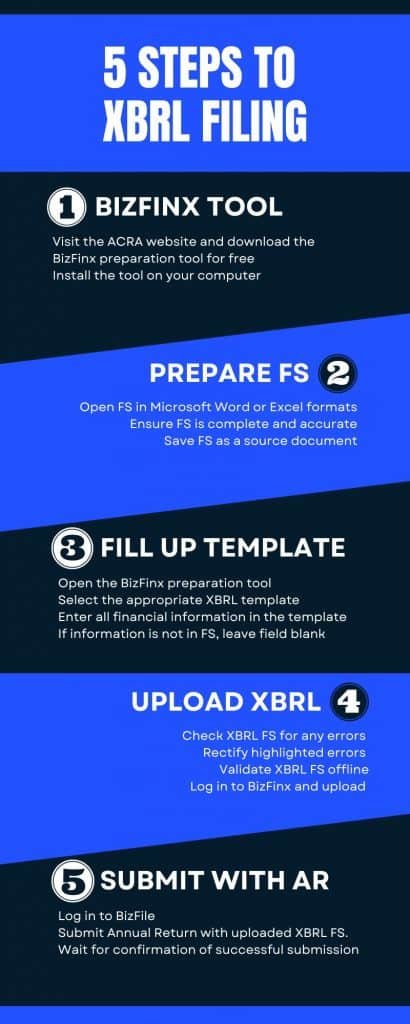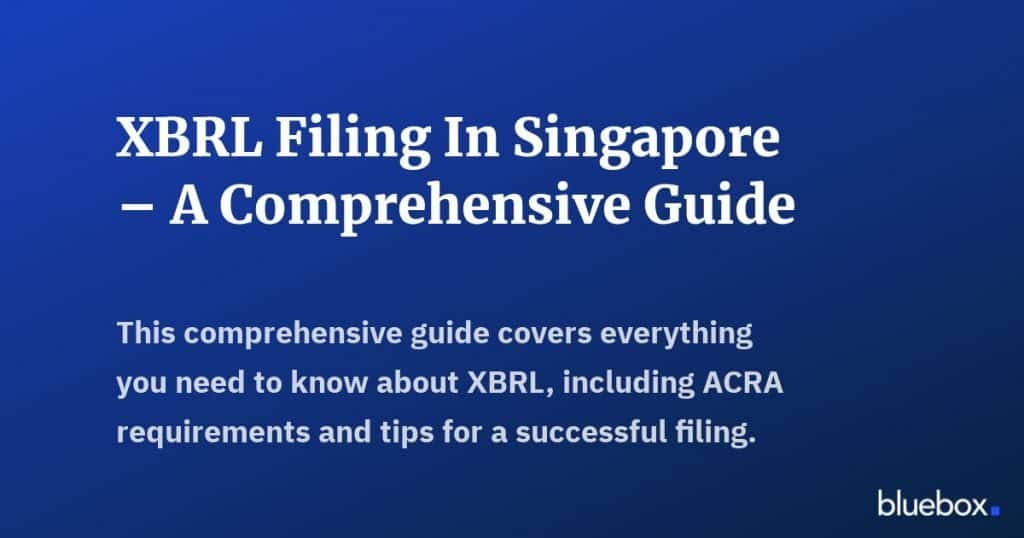XBRL filing in Singapore is a complex process and requires extensive knowledge of the latest regulations. This comprehensive guide has been written to provide an overview of its requirements, guidelines and processes in Singapore. It covers topics such as what XBRL filing is, who needs to file, when filings need to be made, how filings are completed and various other aspects related to XBRL filing in Singapore.
The guide provides detailed information on all aspects of XBRL filing that any specialist should know before commencing the process. The key features discussed include definitions for terms used in relation to XBRL filing; relevant legislation applicable in Singapore; registration procedures; types of financial statements required; timelines for submission; penalties incurred for non-compliance; etc. In addition, this guide also includes tips and advice from experienced professionals on how best to meet the regulatory requirements while minimising errors during the filing process.
Overall, this guide offers up-to-date insights into the complexities of XBRL filing in Singapore and serves as a valuable resource for those seeking guidance on complying with the legal obligations associated with it.
Understanding XBRL Filing Requirements for your Company In Singapore
XBRL filing, also known as e-filing, is a standardized way of providing financial data to the Accounting and Corporate Regulatory Authority (ACRA) in Singapore. It requires companies to submit their financial statements in XBRL format using a specific download process. This allows ACRA to easily access and analyze all reported information quickly and accurately.
The requirement for XBRL filing was introduced by ACRA in March 2011 with the aim of increasing transparency and accuracy in corporate reporting within Singapore. By complying with the XBRL guidelines set out by ACRA, companies are able to provide more structured and detailed reports that can be used for better decisions making. As such, it is important for entities registered under ACRA to understand the requirements surrounding XBRL filing so they can ensure full compliance when submitting their financial statements.
Exemptions from XBRL Filing Requirements
The following types of entities are exempted from XBRL filing in Singapore:
- Merchant and commercial banks;
- Finance companies that are regulated by the Monetary Authority of Singapore (MAS);
- Licensed insurers;
- Solvent exempt private companies (solvent EPCs);
- Companies that use accounting standards other than Singapore Financial Reporting Standards (SFRS), SFRS for Small Entities, and IFRS.
Businesses have the option to submit their financial statements in PDF format, while banks, finance companies, and insurers are required to provide Financial Statements Highlights (FSH) in XBRL format. Insolvent Companies (EPCs) are required to submit a complete set of financial statements either in full XBRL format or in PDF format accompanied by a simplified XBRL template.
Benefits of Filing XBRL
That said, even if you are exempt from filing XBRL, there are benefits to voluntarily filing XBRL. The XBRL reporting standard simplifies financial statement preparation for Singaporean companies, and enables regulators to efficiently analyze this data. This system offers several benefits.
- Better understanding of business data, including ability to analyze accounting data for big sets.
- Automated report generation ability for faster, accurate, and reliable handling of data
- Better regulations at lower cost.
Deadline And Guidelines
Under the Accounting and Corporate Regulatory Authority (ACRA) in Singapore, all companies must abide by certain filing deadlines and guidelines. XBRL International sets out a number of international standards for electronic financial reporting using XBRL taxonomy. To simplify the process of meeting these requirements, ACRA has developed BizFinx – a multi-upload tool allowing companies to submit their reports in an easy and efficient manner.
When is the XBRL Filing Deadline?
The filing deadlines that companies need to be aware of vary depending on type of business entity. The deadline corresponds to the deadline for annual return filing for the company. Below is a list of the various types of entities with their respective filing deadlines for filing annual returns and xbrl:
| Type of Company | Filing Deadline |
|---|---|
| Private Companies | 7 months after year end |
| Public Companies | 5 months after year end |
| Foreign Companies with Singapore Branches | 5 months after year end |
It is important for organizations to meet these filing deadlines as failure to do so may result in penalties such as fines or other sanctions from ACRA. Additionally, it should also be noted that any changes made outside the timelines specified by ACRA will not be reflected in company records until approved by them. Therefore, it is essential for organizations to ensure they have taken necessary steps to adhere to both the set timeline and regulations when submitting their filings through Bizfinx Multi Upload Tool.
What type of XBRL is required to be Filed?
| XBRL Filing Requirements | Companies that file FS that are made public |
|---|---|
| Simplified XBRL template | Smaller and non-publicly accountable companies A non-publicly accountable company refers to a company that is not listed nor in the process of listing securities in an exchange in Singapore or outside Singapore and certain specific types of financial institutions |
| Full XBRL template | SG-incorporated companies not covered in Groups 2 to 5, SG-incorporated exempt private companies (EPCs) that are insolvent |
| Financial Statement Highlights (FSH) with PDF copy | SG-incorporated companies in the business of banking, finance and insurance regulated by MAS using XBRL FSH Template for Banks or Template for Insurance companies as appropriate |
| PDF copy of Financial Statements | EPCs that are solvent, (they also have option of filing in XBRL as per above) Companies using accounting standards other than prescribed accounting standards in Singapore or IFRS, SG-incorporated companies limited by guarantee, Foreign companies with SG branches |
Note that previous filing requirements were different prior to 1 May 2021 however to give you the most recent information we have focused this on the requirements post 1 May 2021.
Tools For XBRL Conversion
The filing of financial statements in XBRL format is a mandatory requirement for entities registered with the Accounting and Corporate Regulatory Authority (ACRA) in Singapore. In order to comply with this regulation, organisations must use appropriate tools to convert their financial data into XBRL-compliant documents. The most common tools used for its conversion are the XBRL converter tool and the XBRL editor. This section will explore these two tools as well as discuss relevant charges associated with using them.
XBRL Converter Tool
This software is designed to convert existing files such as Word or Excel spreadsheets into standardised XBRL tags that can be easily read by ACRA’s online reporting system. It helps companies save time and money since it eliminates manual processing of data and ensures compliance with regulations. Additionally, its user interface allows users to customise settings according to their own preferences. | Cost : Low – Medium | Time Taken : Low – Medium
XBRL Editor
This is an advanced version of the converter tool which enables users to manually edit XBRL files. It provides more flexibility compared to the converter tool as it allows users to manipulate tag names, values, descriptions, relationships between different items etc., thereby allowing for greater accuracy in producing compliant documents. However, due to its complexity, it requires higher levels of expertise from the user and may incur additional costs depending on the level of service rendered by professional consultants hired for assistance.| Cost : High | Time Taken : High
Overall, both tools provide great utility when converting financial data into XBRL-compliant reports required by ACRA; however, businesses also have to consider other factors like cost incurred and time taken before making a decision about which option would best suit their needs.
Note that use of a tool does not mean you do not need to have knowledge of accounting concepts and the types of accounting standards as this knowledge will be necessary to ensure the information is correctly filled out in the XBRL template.
5 Steps to Filing Financial Statements in XBRL Format in Singapore:
Step 1: Download the BizFinx preparation tool
- Visit the ACRA website and download the BizFinx preparation tool for free.
- Install the tool on your computer.
Step 2: Prepare the financial statements
- Open the company’s financial statements in either Microsoft Word or Excel formats.
- Review the financial statements to ensure that they are complete and accurate.
- Save the financial statements as a source document.
Step 3: Enter financial information in the template
- Open the BizFinx preparation tool.
- Select the appropriate XBRL template.
- Enter all financial information in the template with relevant XBRL tags.
- If the information requested is not mentioned in the financial statements, leave the data field blank.
Step 4: Validate and upload the XBRL financial statements
- Check the XBRL financial statements for any errors or inconsistencies.
- Rectify any highlighted errors or inconsistencies.
- Validate the XBRL financial statements offline.
- Log in to BizFinx and upload the validated XBRL financial statements.
Step 5: Submit the annual return with uploaded XBRL financial statements
- Log in to BizFile.
- Submit the annual return with the uploaded XBRL financial statements.
- Wait for confirmation that the submission has been successful.
It is important to note that detailed instructions and guidelines for filing financial statements in XBRL format can be found on the ACRA website. Companies should also ensure that they are using the latest version of the BizFinx preparation tool and XBRL templates, and that all information entered into the templates is accurate and complete.

Requirements for Filing – From ACRA Taxonomy
The Singapore Accounting and Corporate Regulatory Authority (ACRA) publishes a Table of Minimum Requirements List, which outlines the mandatory filing requirements for companies looking to submit documents in XBRL format. This list specifies what elements must be included when converting PDF to XBRL as well as any additional information that should be provided in order to adhere to IFRS XBRL taxonomy standards. Furthermore, it provides guidance on how each element should be presented within the financial statements so that they can successfully pass through an automated validation process prior to upload into ACRA’s system.
Note this includes the all the primary statements – ie statement of cash flow, balance sheet, as well as income statement. Earlier companies had the option of the type of income statement format to select from but now there is only one option.
In addition, the document contains further instructions regarding the submission process including notification of errors or discrepancies with regards to the accuracy of data entered during XBRL conversion and subsequent validation attempt. It is therefore essential for companies engaging in this procedure understand how it works and are aware of all relevant rules and regulations before attempting this type of filing with ACRA.
Conclusion
Singapore has established a comprehensive regulatory framework for companies to submit their financial statements in its format. Companies must adhere to the filing deadlines and guidelines set by ACRA, Bizfinx, and other relevant authorities. An XBRL converter tool is available to help facilitate the conversion process from traditional formats such as PDFs into XBRL format. The minimum requirements listed in the ACRA taxonomy should be taken into consideration when submitting XBRL filings.
In summary, Singapore’s regulatory environment has made it possible for companies to file their financial statements in an efficient manner with the use of XBRL technology. With the right tools, adhering to the required standards can be simplified while ensuring accuracy and timeliness of submissions. Ultimately, this will allow businesses operating within Singapore to benefit from improved reporting efficiency while meeting compliance obligations effectively.
